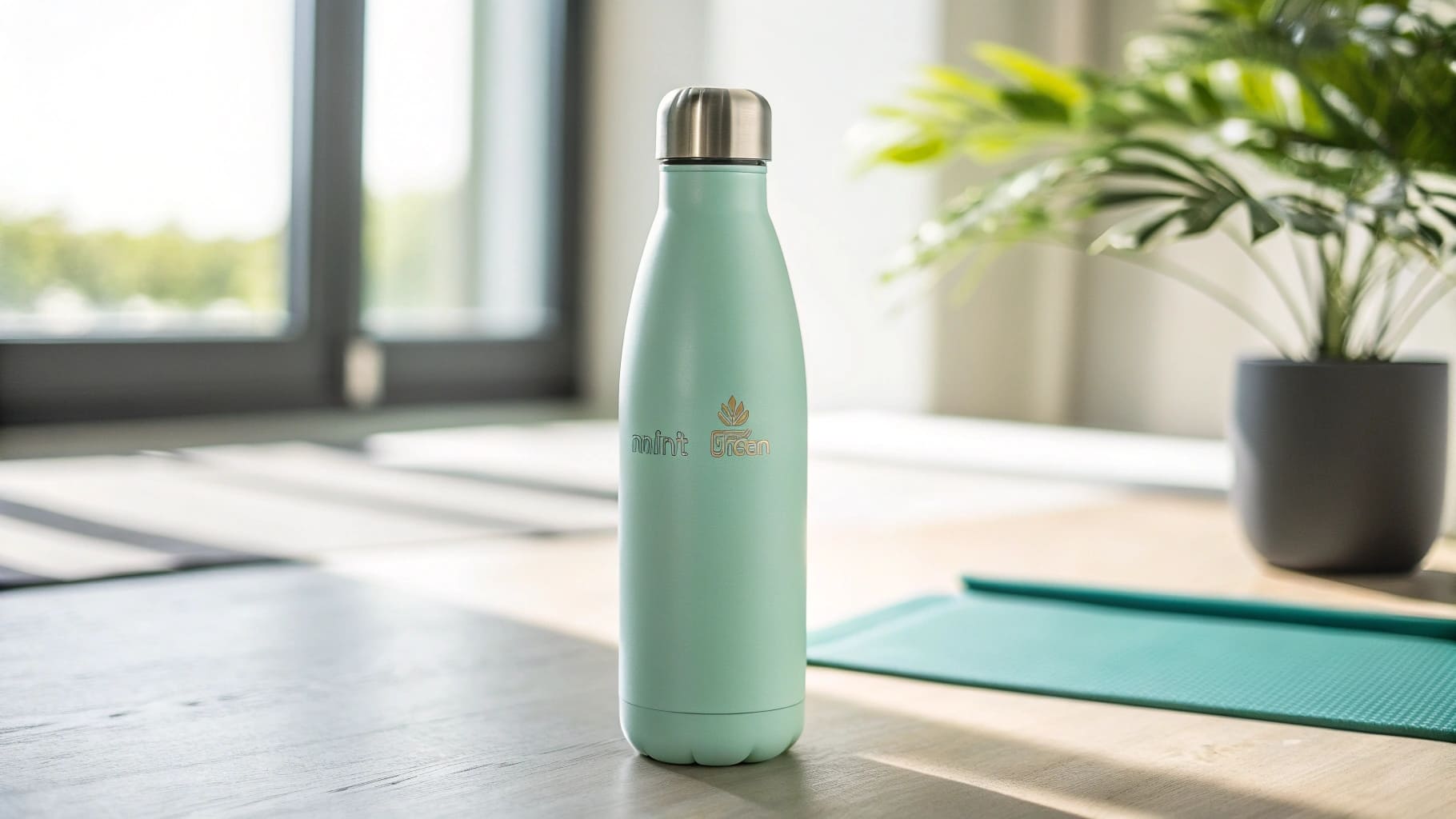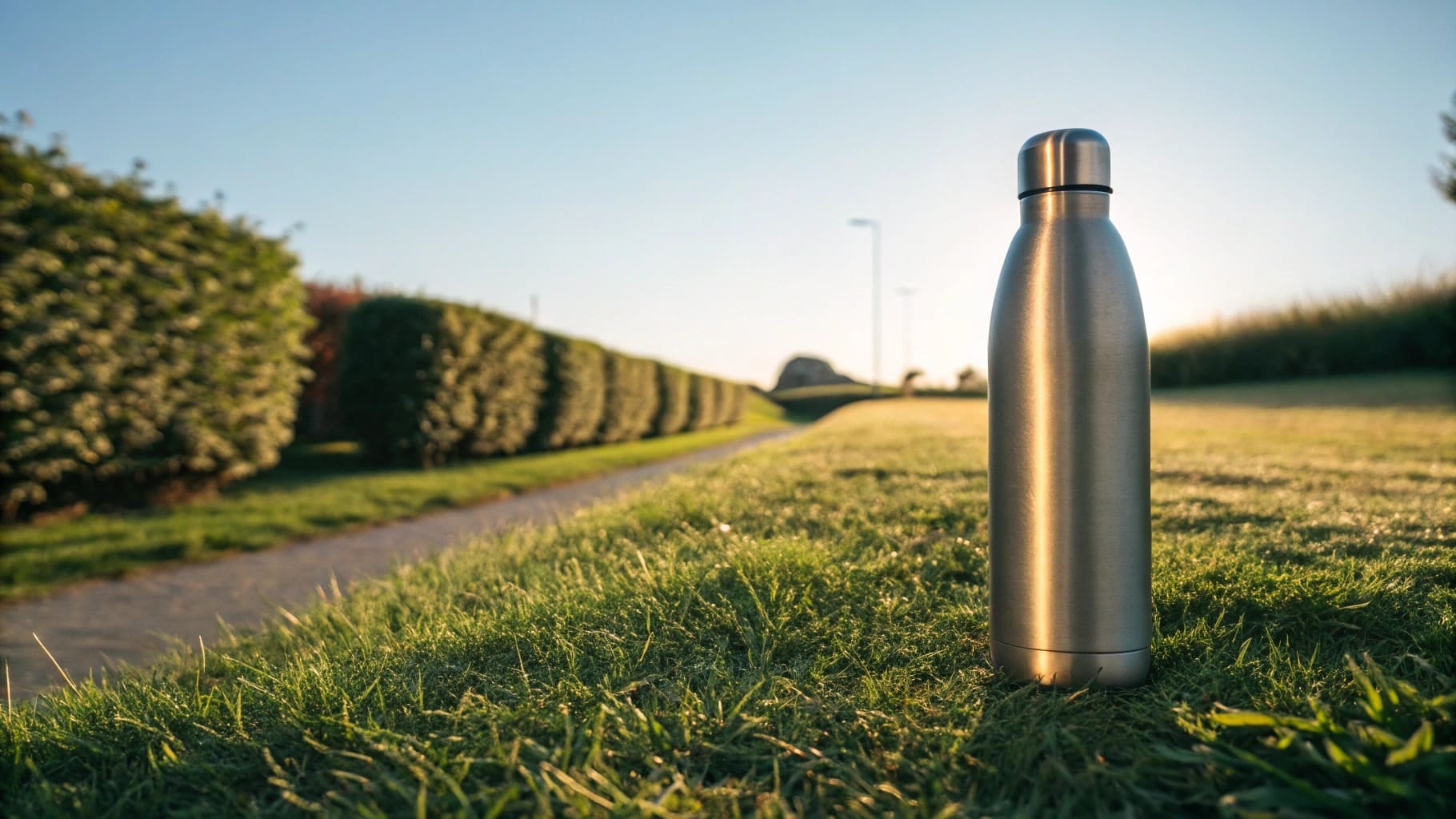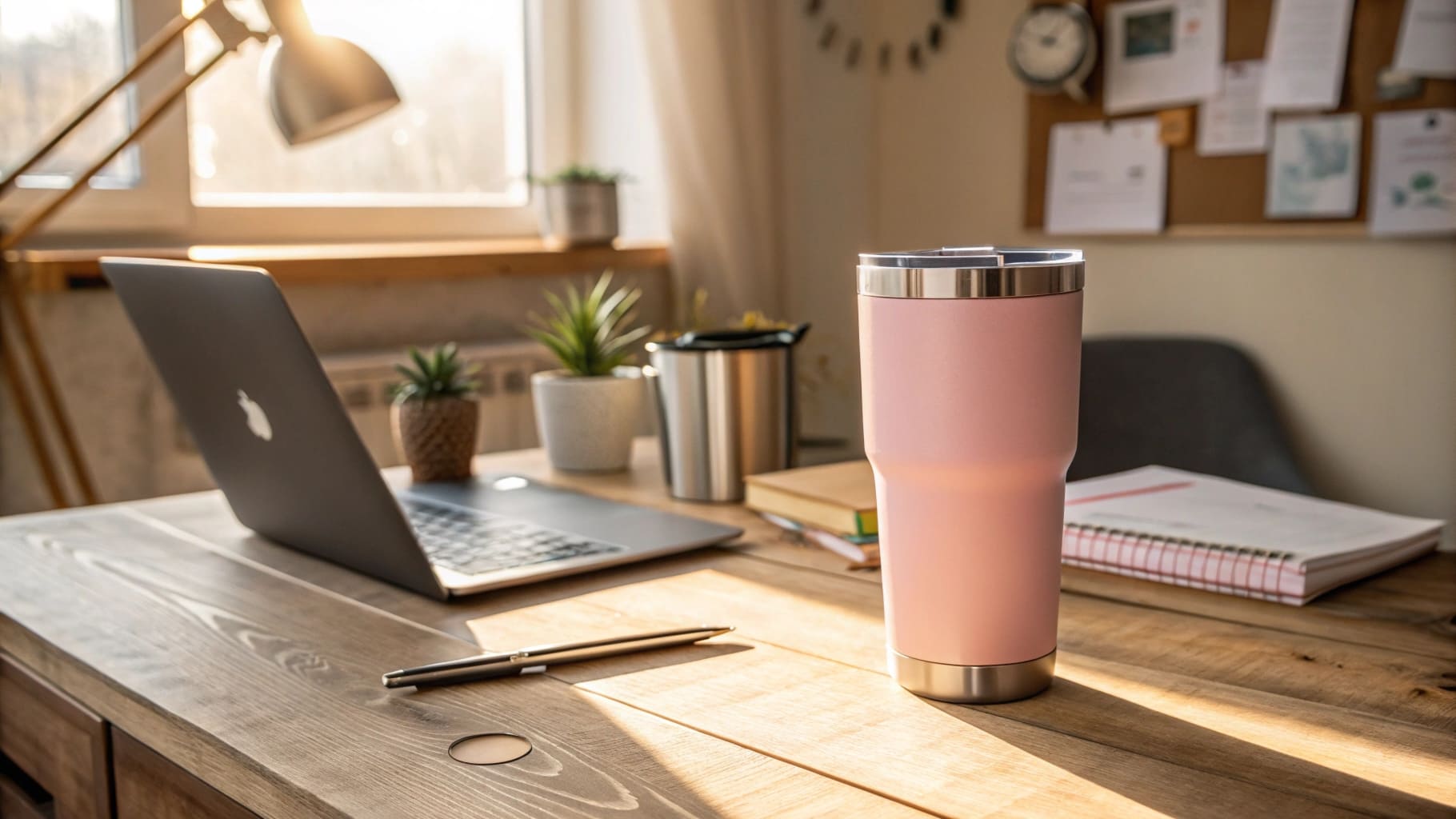Buying reusable bottles feels complex? Many choices for your business? Wrong picks cost money and frustrate customers. I will give you key info so you can buy smart.
Before buying reusable bottles, especially for B2B, you need full details. Think about materials. Consider safety papers like FDA or LFGB. Also, look at custom logo options, your market's needs, and features like good insulation and leak-proof lids.

Okay, you want the best reusable water bottles for your business. Getting this right from the start saves a lot of trouble later. I will break down what you really need to know. This will help you make a smart decision. You will feel more confident choosing what's best for your needs.
What to look for in a reusable water bottle?
Too many features? Don't know what's vital in a water bottle for your business? Choosing blindly can lead to unpopular products. This means wasted stock. Focus on these key aspects for success.
You should look for material quality, like 304 or 316 stainless steel1. Good insulation is important. Lids must be leak-proof. Easy cleaning, often with a wide mouth, is a plus. Durability and options for branding your logo are also key. These features greatly affect user happiness.

When you are sourcing reusable water bottles for your brand or wholesale business, details matter a lot. I always tell my clients, like Mark Shenng from Canada, that the end-user experience defines a product's success. Mark is very particular about quality because he rebrands products for the Canadian market. He needs a product that reflects well on his brand.
Key Material Considerations
The material is often the first thing to check.
- Stainless Steel (304/316): This is a top choice for many B2B buyers. It is very durable. It resists rust. It keeps drinks hot or cold for many hours. Stainless steel also feels premium. And it does not leach chemicals. At Icobottle, we specialize in these because they offer top quality. The main things to think about are its weight and cost, which can be higher.
- Glass: Glass bottles offer a very pure taste. But they can break easily. This makes them less ideal for some active users.
- BPA-free Plastics2: These are lightweight. They are often cheaper. This can be good for large promotional orders. But, make sure they are truly BPA-free and durable.
Here's a simple comparison:
| Feature | Stainless Steel (304/316) | Glass | BPA-free Plastic |
|---|---|---|---|
| Durability | Very High | Low (fragile) | Medium |
| Insulation | Excellent (with double wall) | Poor | Poor to Fair |
| Weight | Medium to Heavy | Heavy | Light |
| Cost | Medium to High | Medium | Low to Medium |
| Chemical Safety | Excellent | Excellent | Good (if BPA-free) |
| Premium Feel | High | High | Low to Medium |
Design and Functionality
Beyond the material, think about how the bottle is designed.
- Insulation: Double-wall vacuum insulation is popular. It can keep drinks hot for up to 12 hours. It can keep them cold for up to 24 hours. This is a big selling point.
- Lids: Lids must be leak-proof. No one wants a spill in their bag. Different lid types (screw-on, flip-top, straw lid) suit different needs.
- Ease of Cleaning: A wide mouth makes cleaning much easier. This is important for hygiene.
- Ergonomics: How does the bottle feel in hand? Is it easy to carry?
- Customization: For B2B, this is vital. At Icobottle, we offer many options for custom logos and colors. This helps brands like Mark's stand out. I remember a client who wanted a very specific Pantone color match. We worked hard to get it perfect. It made their product unique.
What are the requirements for water bottles?
Unsure about bottle safety standards? Worried about legal compliance for your market? Non-compliant bottles risk recalls. They can also mean fines and a damaged reputation. Understand these crucial requirements before you order.
Key requirements for water bottles include meeting food-grade safety standards3. Examples are FDA for the US and LFGB for Europe. Bottles must be BPA-free. Increasingly, sustainability is important. This means using recyclable materials like stainless steel and ethical production.

When I talk to procurement officers, especially those new to importing, I always stress the importance of compliance. It's not just about ticking a box. It’s about protecting your customers and your business. Mark Shenng knows this well. He has faced issues with suppliers providing fake certificates in the past. This is a big pain point for him. So, he is very careful about verification.
Safety and Compliance Standards
These are non-negotiable. Your bottles must be safe for people to use with food and drinks.
- Food-Grade Materials: All parts that touch the liquid must be made from materials approved for food contact.
- FDA (U.S. Food and Drug Administration): If you sell in the USA, your bottles must meet FDA standards.
- LFGB (Lebensmittel-, Bedarfsgegenstände- und Futtermittelgesetzbuch): This is the German Food and Commodities Act. It's a key standard for products sold in Europe. LFGB tests are often stricter than FDA.
- BPA-Free: Bisphenol A is a chemical that people want to avoid. Always ensure your plastic components (if any) and bottles are BPA-free. We ensure all Icobottle products meet these standards. We provide genuine certificates.
Here's a look at common certifications:
| Standard | Region/Focus | Key Checks | Importance for Buyers |
|---|---|---|---|
| FDA | USA | Material safety, chemical leaching (e.g., lead, cadmium) | Essential for US market access |
| LFGB | Europe (Germany) | Stricter material safety, sensory tests (no odor/taste transfer) | High trust mark in Europe |
| BPA-Free | Global | Absence of Bisphenol A in plastics/resins | High consumer demand |
| Prop 65 | California (USA) | Disclosure of specific harmful chemicals | Important for California market |
Sustainability Requirements
More and more consumers care about the environment. Your product choices can reflect this.
- Reusability: The main point of these bottles is to reduce single-use plastic waste. Durability is key here. A bottle that lasts for years is truly sustainable.
- Material Choice: Stainless steel is a great option. It is very durable. It is also highly recyclable at the end of its life.
- Production Impact: Think about the manufacturing process. Are factories using responsible practices? This is harder to check. But good suppliers are often transparent. I always try to be open about our processes at Icobottle.
- Packaging: Can you use eco-friendly packaging? This adds to the sustainable image.
I once worked with a startup boss who was building an eco-conscious brand. For her, the sustainability story was as important as the product quality. We helped her source stainless steel bottles with minimal, recyclable packaging. This really helped her brand connect with her target audience.
Which kind of reusable water bottle is best?
So many bottle types! Which one is truly the "best" choice for your business? Picking the wrong type can mean missing what your market wants. This can lead to lost sales. Discover which bottle type often wins for B2B.
For B2B customers, stainless steel water bottles are often the best choice. This is due to their great durability. They also have a premium feel. And they offer excellent options for adding your brand logo. They give good long-term value. They also fit with today's sustainability trends.

Deciding on the "best" bottle always depends on what you need it for. Who are your customers? What is your budget? As a manufacturer in China, I've seen trends shift. But for businesses aiming for quality and a good brand image, like Mark Shenng's company in Canada, stainless steel consistently comes out on top. He needs products that last and that his customers will love using. This makes stainless steel ideal for his rebranding profit model.
Why Stainless Steel Often Shines for B2B
For many B2B applications, particularly when dealing with importers, wholesalers, or companies looking for quality promotional items, stainless steel has clear advantages.
- Durability and Longevity: These bottles can last for years. This means better value for money in the long run. It also supports the idea of sustainability.
- Perceived Value: Stainless steel feels more premium than plastic. This can enhance your brand's image. When a company gives a stainless steel bottle as a gift, it sends a message of quality.
- Customization Excellence: The surface of stainless steel is perfect for various branding methods. Think laser engraving or high-quality printing. Icobottle offers many custom logo and color options4.
- Health and Safety: High-quality stainless steel (like 304 or 316) doesn't react with drinks. It doesn't impart flavors. And it's naturally BPA-free.
- Temperature Retention: Double-walled stainless steel bottles are excellent at keeping drinks hot or cold. This is a feature consumers really value.
When Other Materials Might Be Better
While stainless steel is a strong contender, it's not always the only answer.
- High-Volume, Low-Cost Promotions: If you need thousands of bottles for a giveaway and budget is very tight, a good quality, durable BPA-free plastic bottle might be more practical. They are lighter to ship too.
- Specific Use Cases: For sports where weight is critical, some advanced plastics might be preferred. For situations where taste purity is the absolute priority and risk of breakage is low, glass could be chosen.
I had a client, a procurement officer for a large company planning a massive outdoor event. They needed 10,000 bottles. While they liked stainless steel, the budget and logistics for that volume led them to choose a robust, BPA-free plastic bottle with a custom print. It still served the purpose of promoting reusability.
Here’s a quick guide for different B2B needs:
| B2B Need | Likely Best Material Choice | Key Reasons |
|---|---|---|
| Corporate Gifting (Premium) | Stainless Steel | High perceived value, durability, branding |
| Brand Resale (Quality Focused) | Stainless Steel | Quality image, longevity, customer appeal |
| Promotional Giveaway (Large Volume) | BPA-free Plastic / Basic SS | Cost-effectiveness, lighter weight |
| Employee Welcome Kits | Stainless Steel | Durability, daily use, promotes wellness |
| Sports Team Merchandise | Stainless Steel / Performance Plastic | Durability, insulation (SS), lightweight (plastic) |
Ultimately, understanding your specific market and how the bottle will be used is key. For someone like Mark, who finds suppliers on Google or at trade shows, having clear requirements helps him filter options quickly. He focuses on quality inspection and reliable logistics, which are easier to manage with experienced suppliers of quality materials like stainless steel.
Conclusion
Gathering good information is very important. Know your materials, requirements, and bottle types. This helps you choose the best reusable water bottles. Make smart B2B sourcing decisions for your business success.
-
Explore the advantages of these stainless steel types for durability and safety in reusable water bottles. ↩
-
Discover the benefits of BPA-free plastics, including safety and cost-effectiveness for promotional products. ↩
-
Understanding food-grade safety standards is crucial for ensuring the safety and compliance of your water bottles. Explore this link to learn more. ↩
-
Discover how customization can elevate your brand image and customer engagement through personalized water bottles. ↩

